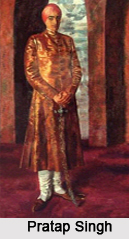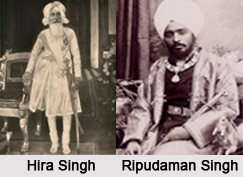 During British rule in India (which covers both the British East India Company rule and later the British Raj), the princely state of Nabha was ruled by Rajas and Maharajas. The rulers of Nabha are given below.
During British rule in India (which covers both the British East India Company rule and later the British Raj), the princely state of Nabha was ruled by Rajas and Maharajas. The rulers of Nabha are given below.
Rajas of the Princely State of Nabha
Hamir Singh had served Nabha as the Raja. Jaswant Singh was the Raja of Nabha from December, 1783 to 21st of May, 1840. He had conducted elongated campaigns against Jind and Patiala in order to regain disputed territory for his state. He is also known to help the British in the Gurkha war in 1814 and in the Kabul campaign in 1838. Devendra Singh was the Raja of Nabha from 21st of May, 1840 to 18th of September, 1846. He had sympathized with the Sikhs and consequently lost a quarter of his possessions.
 Bharpur Singh was the Raja of Nabha from 18th of September, 1846 to 9th of November, 1863. Bhagwan Singh was the Raja of Nabha from 9th of November, 1863 to 31st of May, 1871. Hira Singh was the Raja of Nabha from 31st of May, 1871 to 12th of December, 1911. During his reign, great monuments, public buildings, hospitals, schools, palaces, irrigation canal, etc were constructed. An efficient modern army was also established and agriculture flourished at the time.
Bharpur Singh was the Raja of Nabha from 18th of September, 1846 to 9th of November, 1863. Bhagwan Singh was the Raja of Nabha from 9th of November, 1863 to 31st of May, 1871. Hira Singh was the Raja of Nabha from 31st of May, 1871 to 12th of December, 1911. During his reign, great monuments, public buildings, hospitals, schools, palaces, irrigation canal, etc were constructed. An efficient modern army was also established and agriculture flourished at the time.
Maharajas of the Princely State of Nabha
Hira Singh also served Nabha as a Maharaja from 12th of December, 1911 to 24th of December, 1911.
Ripudaman Singh was the Maharaja of Nabha from 1911 to 1928. He is credited with the reformation of the state judiciary, establishment of a legislature and an executive council to govern Nabha, etc. Events in Amritsar Massacre in 1919 compelled him to publicly oppose the British and clash with his distant cousin, Bhupinder Singh of Patiala, who strongly supported British rule in India. Being suspected of kidnapping and attempted murder through poisoning, Ripudaman Singh was forced to relinquish control of Nabha to a British administrator in 1923. Pratap Singh was the last Maharaja of Nabha from 19th of February, 1928 to 15th of August, 1947. Singh had served as a Lieutenant in the British Indian Army and also served in the Second World War. He was promoted to Captain in 1944, Lieutenant-Colonel in 1945 and Colonel in 1946. He also acted as the aide-de-camp to the President of India and the head of the Sikh Regiment. Pratap Singh signed the Instrument of Accession to India on 15th of August, 1947 and made Nabha a part of Pepsu in 1948.



















